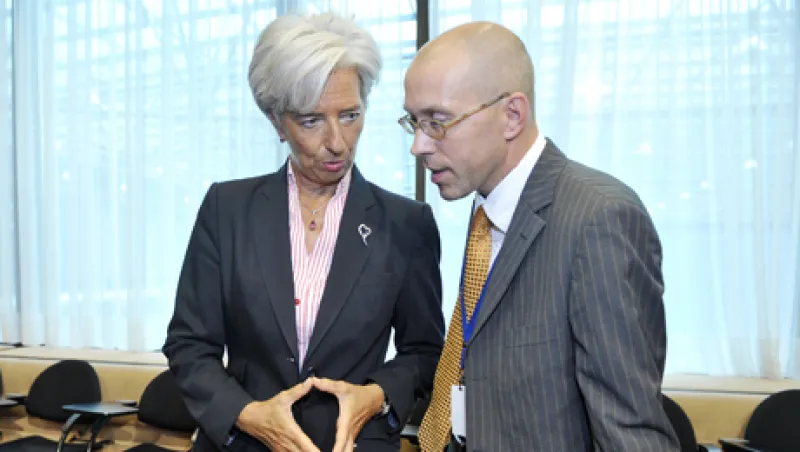As Europe’s debt crisis has worsened dangerously in recent weeks, all eyes have turned to Germany to see whether the bloc’s largest member can save the euro. Earlier this week, Chancellor Angela Merkel and French President Nicolas Sarkozy endorsed a proposal that would require euro members to pass balanced budget amendments to their constitutions and make sanctions for violations virtually automatic, but it was unclear whether the plan would win the support of the full European Union at the bloc’s summit in Brussels today and tomorrow (December 8 and 9).
Jörg Asmussen, the State Secretary who serves as deputy for international affairs to Finance Minister Wolfgang Schäuble, has played a key role in forging Germany’s response to the debt crisis. He will continue to play a pivotal role when he moves to Frankfurt next month to take a seat on the European Central Bank’s executive council. He outlined Germany’s position recently with Institutional Investor’s International Editor, Tom Buerkle.
Institutional Investor: The past 18 months have seen a series of crises with contagion reaching the heart of the euro area. Why has this situation continued to get worse? Does this reflect a fundamental flaw of the European Economic and Monetary Union (EMU)?
Asmussen: This is not a crisis of the euro. The euro has delivered internal and external price stability. The inflation rate of the euro in Germany over the last 10 years has been lower than that of the Deutsche mark. What we clearly have is a sovereign debt crisis in some euro zone countries. The reasons for this are twofold. First, fiscal policy has been too lax in some countries, and second, especially in Greece but, to name another example, also in Portugal, there has been a deterioration of competitiveness.
The EMU needs a better governance structure. This is what we are looking for right now. We need fiscal surveillance under the Stability and Growth Pact with more automatic sanctions. We need to better take into account the debt situation of EMU member states, and to lay out in clear steps how to bring down debt to 60 percent of GDP. We already have a new procedure to identify and correct excessive economic imbalances. We also strive to change elements of our crisis management tools with the introduction of the ESM (European Stability Mechanism), where we will no longer take decisions with unanimity but with an 85 percent majority. And we will have to improve European competitiveness and foster growth.
Sanctions and automaticity have been debated since the origins of the Stability Pact. Why should investors believe that these reforms are going to work better than previous versions?
We will be changing the decision-making process, for example by giving more power to the European Commission when a country is facing an excessive deficit procedure. Measures can no longer be evaded or circumvented. But this cannot substitute for what needs to be done at the country level: Countries must follow sound fiscal policies and maintain or restore their competitiveness.
Outside Germany there is acceptance of the need for greater discipline, but at the same time, people are looking for solidarity. If you’re asking countries to make deep and painful cuts, should there be some quid pro quo, like Eurobonds?
We would agree that we need solidity and solidarity. There is a balance that has to be made here. The instruments of solidarity are the EFSF, the ESM and very likely an increase in the resources of the IMF, although this is a question of a larger circle than the EU. Eurobonds are not a crisis management instrument. At the end of the process, when we have a full-fledged stability union, we might consider new forms of common debt management, but not at the beginning.
President Draghi has indicated a willingness by the ECB to play a more active role in the government bond markets if fiscal reforms are ambitious enough. Is that something that the German government would be willing to see?
We have a longstanding tradition here that the German government does not in any way comment on what the independent central bank is doing. I think this is a very good policy. The ECB will do what it needs to do in order to maintain price stability and financial market stability in the euro zone as it is foreseen in the treaties.
What are the biggest risks you see to the implementation of this framework?
There is a risk that governments and the public get tired of what needs to be done. In Greece you can clearly see that after grasping the low-hanging fruit at the beginning of the adjustment program it then became more and more difficult. This is always a problem.
Can you envisage where monetary union will be in 10 years time?
We now have a monetary union with a limited fiscal and a limited political union. I think the only way forward to ensure growth and welfare to the European citizens is further integration. I think we need to have a more integrated fiscal policy. That does not mean necessarily to centralize it all in Brussels. We need to have an open political debate on how we structure and design this fiscal union.






